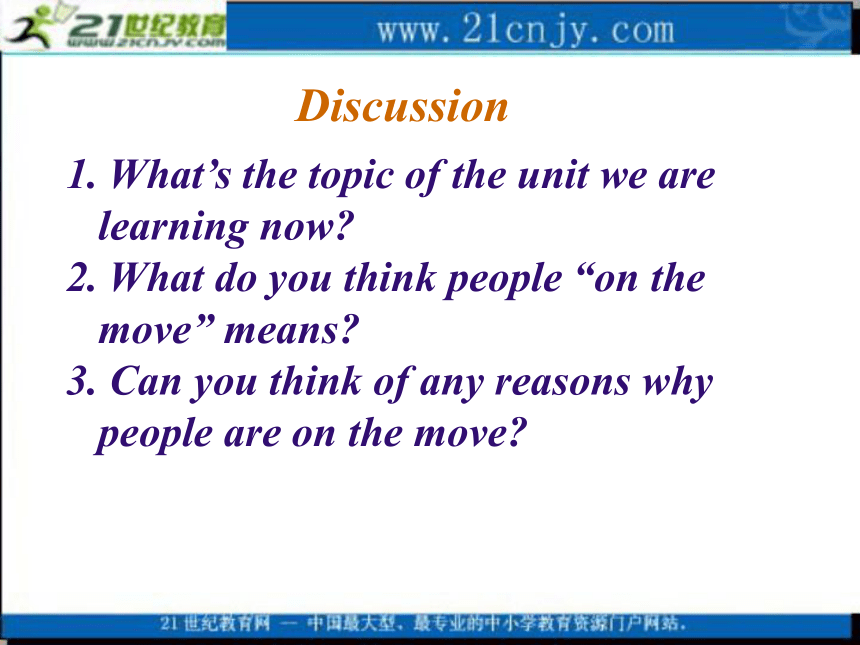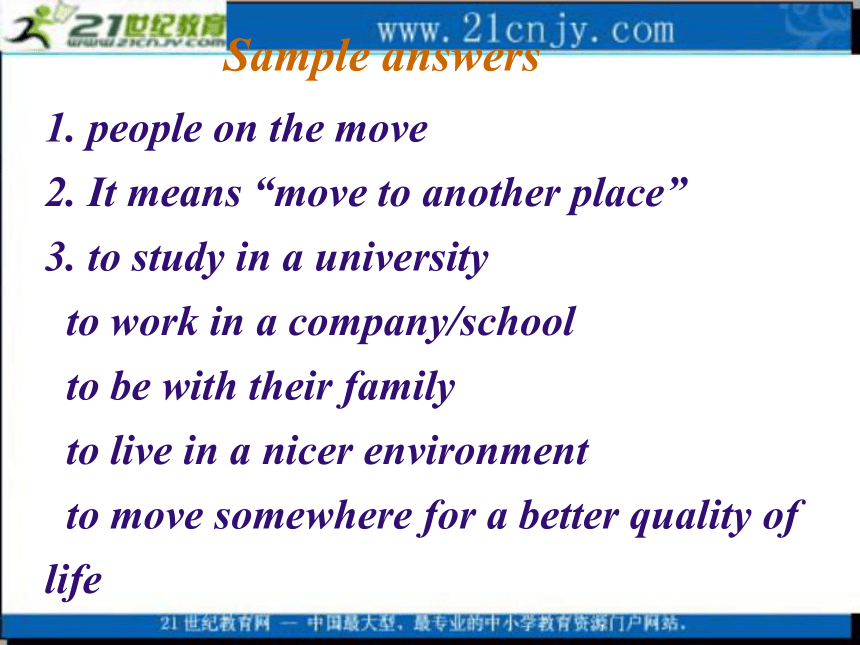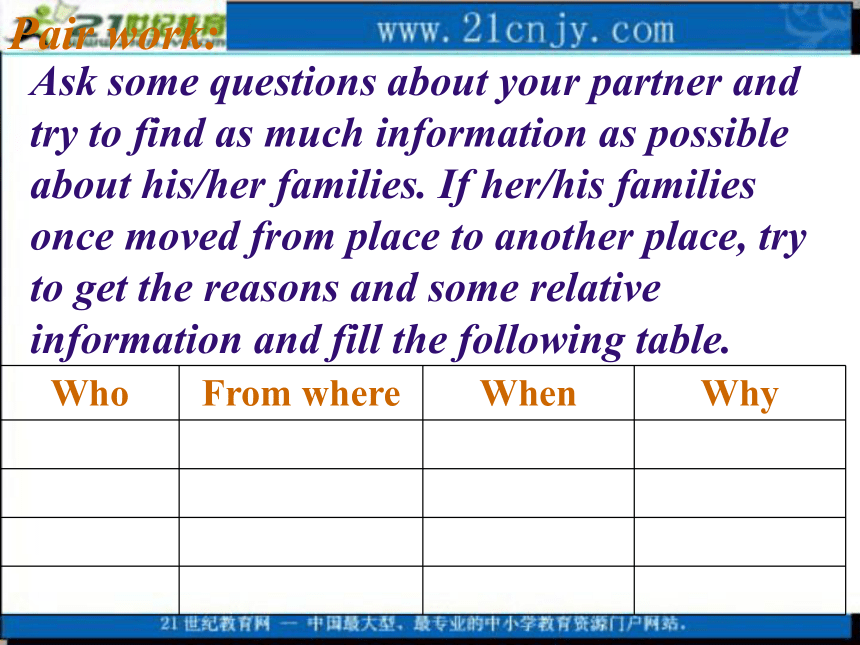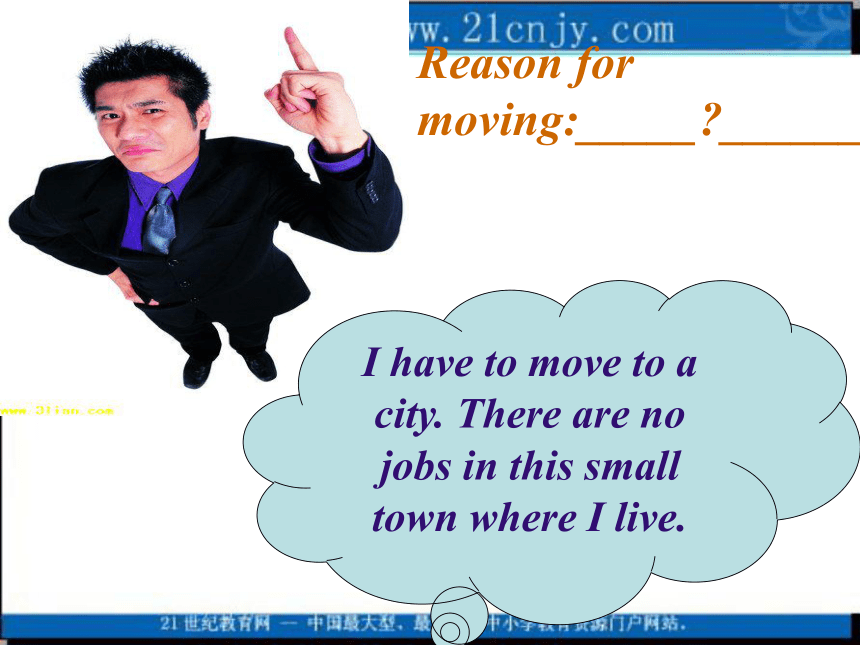英语:unit2 people on the move-welcome课件(牛津译林版选修10)
文档属性
| 名称 | 英语:unit2 people on the move-welcome课件(牛津译林版选修10) |

|
|
| 格式 | rar | ||
| 文件大小 | 1.4MB | ||
| 资源类型 | 教案 | ||
| 版本资源 | 牛津译林版 | ||
| 科目 | 英语 | ||
| 更新时间 | 2009-09-08 00:00:00 | ||
图片预览












文档简介
课件35张PPT。Unit 2
People on the moveWelcome to the unitWith the development of the global and local economy, population mobility has become a new trend in the world. House movingHouse movingDo you often see these scenes in China?Discussion What’s the topic of the unit we are learning now?
2. What do you think people “on the move” means?
3. Can you think of any reasons why people are on the move?1. people on the move
2. It means “move to another place”
3. to study in a university
to work in a company/school
to be with their family
to live in a nicer environment
to move somewhere for a better quality of life Sample answers
Pair work:Ask some questions about your partner and try to find as much information as possible about his/her families. If her/his families once moved from place to another place, try to get the reasons and some relative information and fill the following table. Reason for moving:___?________I just got a new job in another country. I think it’ll be fun to experience a new cultureWe want to live somewhere warm. We’re tired of the snow! Reason for moving:____?_______I’m going abroad to study. I hope to get a better job when I return home.Reason for moving:____?_______I have to move to a city. There are no jobs in this small town where I live. Reason for moving:_____?______We’re moving to a new flat. We need more space so we can all live together. Reason for moving:____?_______Summary of the reasons for movingDiscussion:Have a discussion about the advantages and disadvantages of people moving within China.
1. Have you ever moved to a new flat or a new city? What was the experience like?
2. Do you think moving house can change people’s lives in a positive way? Why or why not?
3. Where would you like to move if you could choose a place to move to? Why?Discussion:For reference 1. Recently, my family has moved into a new flat. This is the first time my family has moved house since I was born. Everyone in my family has been excited. Our new home is much larger than the old one. It is on the first floor and has a courtyard that is about twenty square meters in size. My grandma, who is in her seventies, is very happy because she does not need to climb five floors like she used to in our old house and can plant some flowers in the courtyard. My parents allowed me to decorate my room as I wanted I had the walls in my room painted light blue and stuck some plastic stars on the ceiling. When the light is turned off, these stars seem to be shining. There is a park near my new home, so after supper, we sometimes go for a walk there. 2. I think that moving house can change people’s lives in both a positive and a negative way. You will meet new people and make friends with them. However, you may also miss your old friends.
3. I would like to move if I have been living in the same place for a long time because I want to see, learn and experience new things. The place I want to go to is Shenzhen. Shenzhen is a young city, which has grown form a small fishing village and is still developing quickly. With its fast development, Shenzhen needs young people, especially those who have a good education, to work in the many new companies and business there. Therefore, I think it is a suitable place for young people like me to live and work. It will be easier for me to find a job there, and I will have more choices to do what I want to do. Questions:
1. If you could study or work in a foreign country, which country would you like to study or work in? Why do you want to go there?
2. Which do you think is the most suitable place in China for young people to live and work? Why?
3. Which country do you think is the most suitable one for people to live in? Why?
4. Why do many people from the countryside move to the cities in China? What do you think of the social phenomenon?Language points1. I just got a new job in another country. I think it’ll be fun to experience a new culture.
(P17)我刚刚在一个国家获得一份工作, 我想体验一种新的文化肯定很有趣。1) experience1 [U] (the process of getting) knowledge or skill which is obtained from doing, seeing or feeling things: 经验,体会 The best way to learn is by experience (= by doing things). I don't think she has the experience for the job (= enough knowledge and skill for it). 2 [C] something that happens to you that affects how you feel: 经历;体验 I had a rather unpleasant experience at the dentist's. I did meet him once and it was an experience I shall never forget. experience ?经历;体验 verb [T] If you experience something, it happens to you, or you feel it: We experienced a lot of difficulty in selling our house. New companies often experience a loss in their first few years. 高考链接1. (2005浙江)
I am sure David will be able to find the library—he has a pretty good _______ of direction.
idea B. feeling
C. experience D. sense D2) fun n. [U] pleasure, enjoyment, amusement快乐、享受 Have fun (= Enjoy yourself)! I really enjoyed your party - it was such good fun. She's great fun to be with. "We're going on a picnic at the weekend." "What fun (= how enjoyable)!" fun ?? adjective [before noun] enjoyable: 快乐的、有趣的 There are lots of fun things to do here. fun与funny的辨析:一、首先是明白funny 与 fun 词性不同:funny 是形容词,意为“有趣的,滑稽的,奇怪的”;fun 是名词,意为“有趣的事”。 二、两者含义上也有差别:funny 表示“有趣的,滑稽的”,它指的是一种滑稽可笑的“有趣”,侧重点是让人觉得好玩或发笑。而 fun 则主要指“有趣,好玩”,不像funny 那样强调“滑稽”。 三、比较并体会以下例句: It is more fun to go with someone than to go alone. 偕伴同去比自己独自去好玩。 It‘s funny to see a man walk with his hands and head. 看见一个人倒立走路很滑稽。 高考链接1. (2005重庆)
Daddy didn’t mind what we were doing, as long as we were together, _______ fun.
A. had B. have
C. to have D. havingD2. Where would you like to move if you could choose a place to move to? (P17)
如果你可以选择的话你会去哪里? Choose
verb [I or T] chose, chosen to decide what you want from a range of things or possibilities: 选择,挑选 She had to choose between the two men in her life. He chose a shirt from the many in his wardrobe.. [+ object + to infinitive] The firm's directors chose Emma to be the new production manager. [+ to infinitive] Katie chose (= decided) to stay away from work that day. choose, select, pick, elect 辨与析choose:
(1)及物动词 vt. 挑选;选择;挑出
take out what you want from several things or people
Which one did you choose? 你挑了哪一个?
You have chosen the biggest.
He was chosen out of a hundred. 他是从一百个人里头挑出来的。
He was chosen King挑选他为国王。
(2)及物动词 vt. 宁愿;决定;认作某事适当choose to do, prefer, decide,
?or think fit to do something
She chose to accept his offer. 她决定接受他的提议。
He chose to say nothing about this to anyone 他不愿意把这事对任何人讲。
(3)及物动词 vt. 要;欲want; desire
Take anything you choose 拿你想要的任何东西。elect的用法
(1)及物动词 vt. 选举、推选及物动词 vt. 选举、推选
They elected him chairman of the meeting
Reagan was elected President. 里根被选为总统。
elect a chairman 选举一个主席
(2)elect 指通过投票选择某人担任某职位。例如: We all elected him monitor. 我们一致推举他当班长。 Washington was elected president in 1787. 华盛顿于1787年当选为总统。?pick的用法
(1)及物动词 vt. 拾起;采集take something up with the fingers; gather things
The children were picking tomatoes in the garden 孩子们在园里摘西红柿。
They‘re going to pick cotton this afternoon 今天下午他们去摘棉花。(2)及物动词 挑选 choose someone or something
He always picked the hardest and dirtiest jobs. 他总是挑最脏最累的活干。
The sports master picked the best boys for the team 体育老师挑选了最好的男生参加运动队。
(3)及物动词 vt. 窃取;偷take the contents by stealing; steal from
He had his pocket picked. 他的腰包被掏了。select指“精选”, 即有所淘汰。 He looked through the suits and selected the cheapest one for me. 他细细地翻看这些衣服,给我挑了一件最便宜的。 He has a copy of Selected Works of Mao Tse-tung. 他有一套《毛泽东选集》。 高考链接1. This picture was taken a long time ago. I wonder if you can _______ my father. (2005 湖北)
A. find out B. pick out
C. look out D. speak out B2. She ______ Japanese when she was in Japan. Now she can speak it freely. (2006福建) A. picked out?? B. made out?
C. made up D. picked up
3. It was so dark in the cinema that I could hardly ___________ my friend. (2007 四川)
A. turn out B. bring out
C. call out D. pick out
4. Of the seven days in a week, Saturday is said to be the most popular ____ for a wedding in some countries. (2007 浙江)
A. way B. situation C. event D. choice DDDHomework
1. Summarize the reasons people have for moving.
2. Prepare the Reading part.
People on the moveWelcome to the unitWith the development of the global and local economy, population mobility has become a new trend in the world. House movingHouse movingDo you often see these scenes in China?Discussion What’s the topic of the unit we are learning now?
2. What do you think people “on the move” means?
3. Can you think of any reasons why people are on the move?1. people on the move
2. It means “move to another place”
3. to study in a university
to work in a company/school
to be with their family
to live in a nicer environment
to move somewhere for a better quality of life Sample answers
Pair work:Ask some questions about your partner and try to find as much information as possible about his/her families. If her/his families once moved from place to another place, try to get the reasons and some relative information and fill the following table. Reason for moving:___?________I just got a new job in another country. I think it’ll be fun to experience a new cultureWe want to live somewhere warm. We’re tired of the snow! Reason for moving:____?_______I’m going abroad to study. I hope to get a better job when I return home.Reason for moving:____?_______I have to move to a city. There are no jobs in this small town where I live. Reason for moving:_____?______We’re moving to a new flat. We need more space so we can all live together. Reason for moving:____?_______Summary of the reasons for movingDiscussion:Have a discussion about the advantages and disadvantages of people moving within China.
1. Have you ever moved to a new flat or a new city? What was the experience like?
2. Do you think moving house can change people’s lives in a positive way? Why or why not?
3. Where would you like to move if you could choose a place to move to? Why?Discussion:For reference 1. Recently, my family has moved into a new flat. This is the first time my family has moved house since I was born. Everyone in my family has been excited. Our new home is much larger than the old one. It is on the first floor and has a courtyard that is about twenty square meters in size. My grandma, who is in her seventies, is very happy because she does not need to climb five floors like she used to in our old house and can plant some flowers in the courtyard. My parents allowed me to decorate my room as I wanted I had the walls in my room painted light blue and stuck some plastic stars on the ceiling. When the light is turned off, these stars seem to be shining. There is a park near my new home, so after supper, we sometimes go for a walk there. 2. I think that moving house can change people’s lives in both a positive and a negative way. You will meet new people and make friends with them. However, you may also miss your old friends.
3. I would like to move if I have been living in the same place for a long time because I want to see, learn and experience new things. The place I want to go to is Shenzhen. Shenzhen is a young city, which has grown form a small fishing village and is still developing quickly. With its fast development, Shenzhen needs young people, especially those who have a good education, to work in the many new companies and business there. Therefore, I think it is a suitable place for young people like me to live and work. It will be easier for me to find a job there, and I will have more choices to do what I want to do. Questions:
1. If you could study or work in a foreign country, which country would you like to study or work in? Why do you want to go there?
2. Which do you think is the most suitable place in China for young people to live and work? Why?
3. Which country do you think is the most suitable one for people to live in? Why?
4. Why do many people from the countryside move to the cities in China? What do you think of the social phenomenon?Language points1. I just got a new job in another country. I think it’ll be fun to experience a new culture.
(P17)我刚刚在一个国家获得一份工作, 我想体验一种新的文化肯定很有趣。1) experience1 [U] (the process of getting) knowledge or skill which is obtained from doing, seeing or feeling things: 经验,体会 The best way to learn is by experience (= by doing things). I don't think she has the experience for the job (= enough knowledge and skill for it). 2 [C] something that happens to you that affects how you feel: 经历;体验 I had a rather unpleasant experience at the dentist's. I did meet him once and it was an experience I shall never forget. experience ?经历;体验 verb [T] If you experience something, it happens to you, or you feel it: We experienced a lot of difficulty in selling our house. New companies often experience a loss in their first few years. 高考链接1. (2005浙江)
I am sure David will be able to find the library—he has a pretty good _______ of direction.
idea B. feeling
C. experience D. sense D2) fun n. [U] pleasure, enjoyment, amusement快乐、享受 Have fun (= Enjoy yourself)! I really enjoyed your party - it was such good fun. She's great fun to be with. "We're going on a picnic at the weekend." "What fun (= how enjoyable)!" fun ?? adjective [before noun] enjoyable: 快乐的、有趣的 There are lots of fun things to do here. fun与funny的辨析:一、首先是明白funny 与 fun 词性不同:funny 是形容词,意为“有趣的,滑稽的,奇怪的”;fun 是名词,意为“有趣的事”。 二、两者含义上也有差别:funny 表示“有趣的,滑稽的”,它指的是一种滑稽可笑的“有趣”,侧重点是让人觉得好玩或发笑。而 fun 则主要指“有趣,好玩”,不像funny 那样强调“滑稽”。 三、比较并体会以下例句: It is more fun to go with someone than to go alone. 偕伴同去比自己独自去好玩。 It‘s funny to see a man walk with his hands and head. 看见一个人倒立走路很滑稽。 高考链接1. (2005重庆)
Daddy didn’t mind what we were doing, as long as we were together, _______ fun.
A. had B. have
C. to have D. havingD2. Where would you like to move if you could choose a place to move to? (P17)
如果你可以选择的话你会去哪里? Choose
verb [I or T] chose, chosen to decide what you want from a range of things or possibilities: 选择,挑选 She had to choose between the two men in her life. He chose a shirt from the many in his wardrobe.. [+ object + to infinitive] The firm's directors chose Emma to be the new production manager. [+ to infinitive] Katie chose (= decided) to stay away from work that day. choose, select, pick, elect 辨与析choose:
(1)及物动词 vt. 挑选;选择;挑出
take out what you want from several things or people
Which one did you choose? 你挑了哪一个?
You have chosen the biggest.
He was chosen out of a hundred. 他是从一百个人里头挑出来的。
He was chosen King挑选他为国王。
(2)及物动词 vt. 宁愿;决定;认作某事适当choose to do, prefer, decide,
?or think fit to do something
She chose to accept his offer. 她决定接受他的提议。
He chose to say nothing about this to anyone 他不愿意把这事对任何人讲。
(3)及物动词 vt. 要;欲want; desire
Take anything you choose 拿你想要的任何东西。elect的用法
(1)及物动词 vt. 选举、推选及物动词 vt. 选举、推选
They elected him chairman of the meeting
Reagan was elected President. 里根被选为总统。
elect a chairman 选举一个主席
(2)elect 指通过投票选择某人担任某职位。例如: We all elected him monitor. 我们一致推举他当班长。 Washington was elected president in 1787. 华盛顿于1787年当选为总统。?pick的用法
(1)及物动词 vt. 拾起;采集take something up with the fingers; gather things
The children were picking tomatoes in the garden 孩子们在园里摘西红柿。
They‘re going to pick cotton this afternoon 今天下午他们去摘棉花。(2)及物动词 挑选 choose someone or something
He always picked the hardest and dirtiest jobs. 他总是挑最脏最累的活干。
The sports master picked the best boys for the team 体育老师挑选了最好的男生参加运动队。
(3)及物动词 vt. 窃取;偷take the contents by stealing; steal from
He had his pocket picked. 他的腰包被掏了。select指“精选”, 即有所淘汰。 He looked through the suits and selected the cheapest one for me. 他细细地翻看这些衣服,给我挑了一件最便宜的。 He has a copy of Selected Works of Mao Tse-tung. 他有一套《毛泽东选集》。 高考链接1. This picture was taken a long time ago. I wonder if you can _______ my father. (2005 湖北)
A. find out B. pick out
C. look out D. speak out B2. She ______ Japanese when she was in Japan. Now she can speak it freely. (2006福建) A. picked out?? B. made out?
C. made up D. picked up
3. It was so dark in the cinema that I could hardly ___________ my friend. (2007 四川)
A. turn out B. bring out
C. call out D. pick out
4. Of the seven days in a week, Saturday is said to be the most popular ____ for a wedding in some countries. (2007 浙江)
A. way B. situation C. event D. choice DDDHomework
1. Summarize the reasons people have for moving.
2. Prepare the Reading part.
同课章节目录
- 模块9
- Unit 1 Other countries, other cultures
- Unit 2 Witnessing time
- Unit 3 The meaning of colou
- Unit 4 Behind beliefs
- 模块10
- unit 1 building the future
- unit 2 people on the move
- unit 3 protecting ourselves
- unit 4 law and orde
- 模块11
- unit 1 careers and skills
- unit 2 getting a job
- unit 3 the secret of success
- unit 4 the next step
